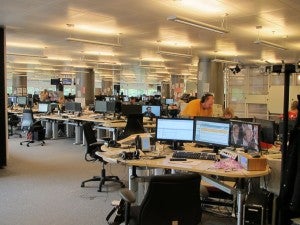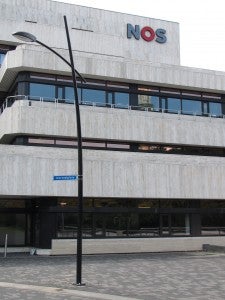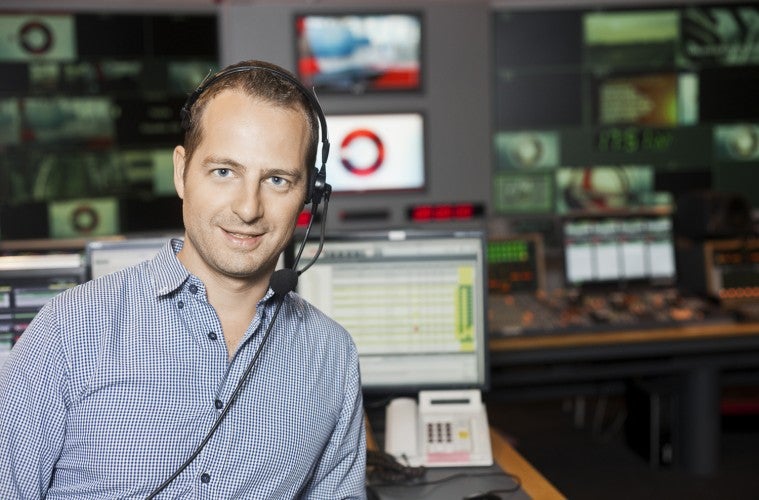The key to career success for Martijn van Beek, Editor-in-Chief of NOS-journaal: ‘For me, it helped that I knew what I wanted from a young age: something with radio or TV.’ After that, he made smart choices and displayed quality work.
As he gives his interviewer a tour of the NOS editorial office, Martijn van Beek (1977) realises again that he works in a unique place. He shows the editing rooms, the desk islands for the economy and domestic news editors, scheduling and Jeugdjournaal children’s news, as well as the studio where the 8 o’clock news is broadcast. Behind a rotating panel, he shows the decor for the Nieuwsuur programme. As Editor-in-Chief, Van Beek is responsible for the composition of the NOS news broadcasts on TV. During the broadcasts, he sits in the studio and gives the newsreader instructions, such as to wrap up an interview when it starts to go over time.
When did you know that you wanted to go into journalism? “I played ‘newsreader’ as a child. My brother and I would record ourselves with a cassette recorder. I never stopped doing that. At secondary school, a friend and I produced a local radio station on the babyphone frequency: he did the technical side, and I did the talking. Only our mothers could listen. For me, it helped that I knew what I wanted.”
‘We would produce radio on the babyphone frequency. Only our mothers could listen’
But you didn’t go to journalism school. “No. I wanted to go to university, because that’s what you’re supposed to do after gymnasium. I was interested in politics, so I enrolled in the broad Political Science study programme and hoped to learn journalism from side jobs and courses. I did volunteer work with the local broadcaster in Amsterdam. There, I saw a notice on the bulletin board that the ANP was looking for people for the radio editorial office to produce the news bulletins for the commercial broadcasters. I got a part-time job there, and after I finished my studies they asked me to come work full-time as an editor-in-chief and newsreader.
“I already had a network at the NOS, because the correspondent in Brussels, Paul Sneijder, liked my thesis. I became his first intern. Now it’s much more difficult to get a foot in the door: students who want to do a work placement at the NOS have to do pitches. But once they get in, and if they’re good enough, they move on to become freelancers and build their careers from there.”

What do you like most about your work? “The most magical part is driving to the studio and not knowing what’s going to happen. After 12 years, I’ve seen everything: falling governments, disasters, And yet it’s always different somehow. It’s great when difficult things come together in the end. Once, in Nieuwsuur [the first 10 minutes of the programme are the responsibility of the NOS, ed.] I had three correspondents in a row who each had to answer two questions. I thought: isn’t this going to be too much? But it turned out great. The correspondents referred to each others’ answers, they articulated their thoughts well and didn’t talk too long. I don’t even remember what it was about, but that was one of the gems.”
What do you do when something enormous happens, such as the crash of flight MH-17 over Ukraine? “We are constantly on the air, lots of things happen live, such as sudden press conferences by the Prime Minister or an address by the King. We are legally required to broadcast them live. As Editor-in-Chief, it’s tense, and you have to perform at the peak of your ability, because suddenly you have to fill 1 1/2 hours of air time. On the one hand, you just ‘get on the air and worry about it later’, but on the other we work to get the most out of the time by arranging for a guest in the studio and a reporter on location. When there’s a hole in the air, we can always ask them to answer some questions.
“You learn a lot. Once, Simone [Weimans, host, ed.] suddenly said on air: ‘What are we going to do now?’ I should have told her that! Luckily, I was able to do so right away. When disasters strike, it’s a madhouse in here. You don’t have any information, but you still have to go on air.”
‘When disasters strike, it’s a madhouse in here’

What is your average work day like? “When I have the morning shift, the alarm clock goes off at 3:45. That’s tough, but when I start work at 4:30, the colleagues quickly create a fun atmosphere. When I get in, I read Teletekst and the website and I meet with the night shift – which I worked for several years – to fill in the empty script. In consultation with the domestic and international news desks, I draw up a script for the TV news broadcasts from 6:30 to 12:00. That can be difficult on Monday mornings, because the sometimes the flow of news dries up. Occasionally, we can just show a map or a photo and repeat items, but we prefer to show new items with new images. The scheduling department often puts new items on the agenda, such as reports by correspondents.
“The unusual working hours are sometimes irritating, but the big advantage of my work is that you don’t have stacks of work piling up, because the day shift takes over at noon.”
I thought there are always editorial meetings. Isn’t it like that? “We don’t hold meetings for the shorter morning and daytime broadcasts, but for the longer evening broadcasts we have meetings at different moments during the day. The editorial coordinators suggest items for the news, and the editors-in-chief ‘order’ items. We then draw up the scripts based on those meetings.”
“I am also occasionally assigned as the domestic editor, so I’m not responsible for compiling the broadcast, but rather for editing items myself. I am one of the few editors-in-chief who also works as a broadcast editor. I don’t see that as a problem; in fact, it’s fun to do the technical work of compiling items and editing them for television.”
Why are you so good at what you do? “For a long time, I thought that they asked me because they couldn’t find anyone else. Especially when the NOS first asked me to work as an editor-in-chief for the night shift, the radio bulletins, and later for Teletekst and the website. Now I understand that I’m appreciated because I’m calm and can make clear decisions quickly. I love order and structure, and my scripts are clear and easy to understand.
“I have broad interests. As an editor, you have to specialise, but as an editor-in-chief it’s handy to be able to appreciate the value of a statement by John Kerry or a local scuffle and to decide whether to run it or not.”
What is the biggest challenge? “I can draw up a script now, and I can deal with the stress of a broadcast. As Editor-in-Chief, my biggest challenge now is to give feedback to colleagues who may have even more experience than I do.”
Does it every go completely wrong? Sometimes, an interview with a correspondent can go wrong. Then I ask myself if I thought of the wrong questions, although you always do that together with someone else. Luckily, the disappointment never lasts longer than the next broadcast.”






